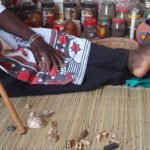Midlands Province, Zimbabwe – In a shocking turn of events, police have apprehended a 24-year-old man at a rural shrine in Silobela, Midlands Province, after he allegedly sought ritual cleansing for a heinous crime committed in Cowdray Park, Bulawayo.
The suspect, identified as Alfred Ngwenya, stands accused of the brutal murder of 26-year-old Azaria Dube, whose life was tragically cut short during a violent altercation over the affections of a woman.
The Cowdray Park community was left reeling in the wake of Dube’s untimely demise. According to eyewitnesses, the altercation that led to the fatal stabbing unfolded near a popular night club at Emasimini Complex, exposing the dark underbelly of a love triangle gone awry. It is believed that the dispute erupted when a group of suspected artisanal miners clashed over the services of a lady of the night.
Authorities swiftly launched an investigation into the incident, and their efforts bore fruit when they apprehended Ngwenya at a remote shrine in Silobela. The arrest not only brought the alleged perpetrator to justice but also led to a crucial discovery – the murder weapon itself. A chilling AK47 CCCP flick knife, stained with the blood of the victim, was recovered from Ngwenya’s possession, further cementing the link between the suspect and the crime.
The motive behind this senseless act of violence, fuelled by jealousy and desire, sheds light on the complexities of human emotions and the consequences they can inflict.
“Reference is made to the Cowdray Park murder case as reported on the ZRP X account posted on 16/11/23. The ZRP reports that Alfred Ngwenya (24) was arrested on 17/11/23 at around 0100hours at a shrine in Silobela where he was allegedly seeking cleansing after having committed the offence. The suspect’s arrest led to the recovery of the murder weapon, an AK47 CCCP flick knife,” police posted on X.
Ngwenya’s desperate attempt to seek ritual cleansing at a shrine following the murder adds a haunting twist to the narrative. The very act of seeking spiritual purification after committing such a heinous crime speaks to the deep-rooted beliefs and superstitions that still permeate Zimbabwean society.












